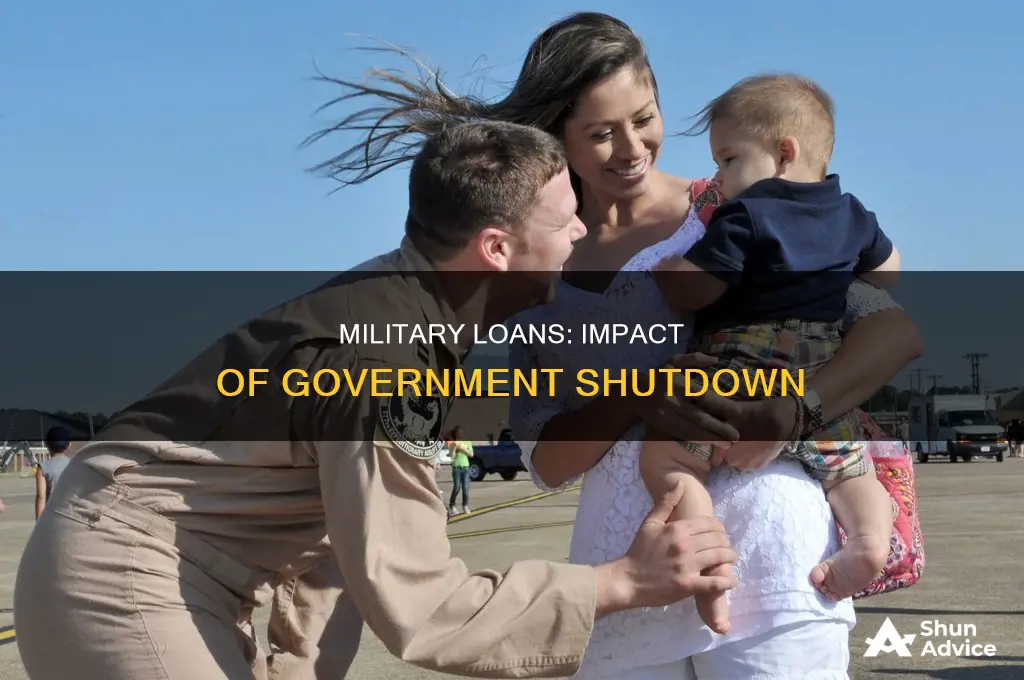
A government shutdown can impact military loans, depending on the specific circumstances. While private lenders for VA and FHA loans remain open during a shutdown, reduced staffing at the U.S. Department of Veterans Affairs and the Federal Housing Administration may cause delays in processing these loans. Additionally, active-duty military personnel may experience disruptions in their pay during a shutdown, which can affect their ability to obtain loans. To assist those impacted, organizations like Navy Federal Credit Union offer loan programs with eligibility based on factors such as direct deposit history and employment status. The availability and impact of military loans during a shutdown can vary, and it's essential to stay informed about the specific situation and any assistance programs offered.
| Characteristics | Values |
|---|---|
| Impact on military pay | Military members usually continue to get paid during a government shutdown, but it's not guaranteed. Active-duty troops may have to work without pay until a budget agreement is reached. |
| Impact on VA loans | VA and FHA loans are made by private lenders that remain open during a shutdown. However, there may be delays due to partial staffing in the Department of Veterans Affairs and the Federal Housing Administration. |
| Government shutdown loan programs | Some organizations, like Navy Federal Credit Union, offer loan programs to assist federal government employees and military service members impacted by a government shutdown. |
| Impact on military operations | A government shutdown can cause internal disruptions within the armed forces, with troops focusing on shutdown-related issues instead of external threats. Training and military exercises deemed essential for operational readiness may continue during the shutdown. |
What You'll Learn

Military pay during a government shutdown
A government shutdown can have significant repercussions for military members and their families. If the government shuts down without a funding bill for the Department of Defense, those serving in the Armed Forces will not receive their paychecks. Only those deemed "'essential' would receive back pay once a shutdown ends and new federal funding is approved.
Congresswoman Jen Kiggans (VA-02) has introduced legislation to ensure members of the military are paid in the event of a government shutdown. The Pay Our Troops Act would make available the necessary funds from the Treasury to pay members of the Armed Forces, as well as civilian employees and contractors of the Department of Defense. The bill garnered 118 cosponsors from both sides of the aisle, and Kiggans has renewed her efforts to push the legislation through ahead of the federal funding deadline.
During a government shutdown, many financial institutions may offer advance pay or other financial assistance to aid military members. Navy Federal Credit Union, for example, offers a government shutdown loan program for federal government employees or military service members whose direct deposits will be impacted by a shutdown. The loan amount is calculated based on the most recent direct deposit of pay that was made to the member's account prior to the interruption.
Additionally, military treatment facilities and on-base healthcare will remain open during a government shutdown, although routine appointments and elective surgeries will have to be rescheduled. Private sector Tricare and the VA healthcare system will remain fully operational, and military exchanges will stay open.
Understanding the Paycheck Protection Loan Repayment System
You may want to see also

VA and FHA loans
A government shutdown will likely have minimal impact on VA and FHA loans. Both the US Department of Veterans Affairs and the Federal Housing Administration will continue to operate with partial staff, and VA loan guarantees will not stop. While the processing of VA and FHA loans may be delayed due to limited staffing, these loans are still expected to be processed during a shutdown as they are considered essential services.
During a government shutdown, the VA will continue to process and deliver benefits to veterans, including compensation, pension, education, and housing benefits. This means that veterans will still be able to use their home loan benefits to buy a home or refinance an existing mortgage. Lenders will be able to order appraisals, obtain a borrower's Certificate of Eligibility, submit the VA Funding Fee, and more. However, there may be some issues with obtaining documentation or verifications for prospective borrowers, as seen during the 2018-2019 government shutdown.
FHA loans, which are government-backed mortgages, will also continue to be processed during a shutdown. The FHA will have limited staff available to endorse new loans, and the time to endorse cases may be extended. While the FHA's condo approval process is on hold during the shutdown, lenders will still be permitted to process condominium approvals under the Direct Endorsement Lender Review and Approval Process (DELRAP).
It is important to note that the impact of a government shutdown on VA and FHA loans depends on how long the shutdown lasts. If the shutdown is brief, the impact on the housing market is not expected to be significant. However, if the shutdown continues for an extended period, there may be more serious consequences, and potential homeowners may experience delays or deals falling through.
Payroll Protection Loan: What's the Repayment Deal?
You may want to see also

Government shutdown loan programs
A government shutdown can impact federal loan programs in several ways. Firstly, it's important to distinguish between different types of loans, as the impact of a shutdown can vary. For example, during a federal government shutdown, the Federal Housing Administration (FHA) and the Small Business Administration (SBA) typically stop approving applications for housing loans and small business loans respectively. This can create major delays in the approval of development, rehabilitation, and refinancing of properties, as well as impact access to capital for small businesses.
On the other hand, VA and FHA loans made by private lenders are generally not affected by a shutdown, as these lenders remain open. However, there may be some confusion during a government shutdown, as the U.S. Department of Veterans Affairs and the Federal Housing Administration operate with partial staffing, reducing their loan processing capacity.
In the case of government employees and military service members, specific loan programs may be available to assist them during a government shutdown. For instance, the Navy Federal Credit Union offers loans to eligible members impacted by the shutdown, with the loan amount based on their most recent direct deposit of pay. To be eligible, individuals must meet certain criteria, such as being a federal government employee or a military service member whose direct deposit of pay will be affected by the shutdown.
Additionally, while Social Security benefit payments are typically not impacted by a government shutdown, new benefit verification and card issuance services may cease, leading to delays in processing claims for new recipients.
It's worth noting that the impact of a government shutdown on loan programs can vary depending on its duration. Longer shutdowns tend to have more significant consequences, as seen in the 2018-19 shutdown, which disrupted access to federal loans and affected the Gross Domestic Product (GDP).
Stimulus Package: EIDL Loans Included or Excluded?
You may want to see also

Internal disruption to the armed forces
A government shutdown can cause internal disruption within the armed forces. Instead of focusing on external threats, troops are forced to turn their attention inwards to the issues that arise from a shutdown. For instance, restrictions on personnel movements and postponements of new programs can occur. This can impact the overall readiness of the military, as seen during the last shutdown in 2019, where many members of the Guard and Reserves had their drills cancelled, reducing their points for the year and leaving them without their expected drill pay.
A shutdown can also affect the pay of active-duty troops and civilian defense workers, who may have to work without pay until a budget agreement is reached. However, those deemed "essential" would typically receive back pay once the shutdown ends and new funding is approved.
The Pentagon has stated that training and military exercises deemed "required to achieve and maintain operational readiness" would be exempt from a shutdown. Defense Secretary Lloyd Austin has the authority to determine which exercises meet this definition, such as operations and training related to Ukraine.
Additionally, a shutdown can impact the promotion of military officers. For example, Sen. Tommy Tuberville, R-Ala., has been blocking military promotions to protest a Pentagon policy that provides service members with time off and travel reimbursement for reproductive health services, including abortions. This has affected several top military leaders and compromised global military readiness and national security.
Overall, a government shutdown can cause significant internal disruption within the armed forces, affecting pay, training, promotions, and overall readiness.
Seller's Role in FHA Loan Process: What to Know?
You may want to see also

Military exercises and training
During a government shutdown, active-duty military personnel must continue performing their assigned duties, but their paychecks are at risk unless Congress passes emergency legislation to ensure uninterrupted payments. This situation can cause uncertainty and financial difficulties for military service members and their families.
To address these challenges, organizations like Navy Federal Credit Union offer government shutdown loan programs. These programs provide loans to eligible military service members impacted by the interruption in their direct deposit pay during a government shutdown. The loan amount is typically calculated based on the most recent direct deposit of pay into the member's account.
While housing and food services for military personnel are generally exempt from the immediate effects of a shutdown, there is still a potential risk of eviction if the Defense Department becomes unable to pay housing companies. Moreover, the shutdown's impact on maintenance activities and medical facilities at military bases can further hinder training and exercise capabilities.
Military Loan Forgiveness: College Dreams, Reality?
You may want to see also
Frequently asked questions
Military members are usually paid during a government shutdown, but it is not guaranteed. Active-duty troops and a limited number of civilian defense employees are expected to remain at their posts during a government shutdown, but they may not be paid until a budget agreement is reached.
VA and FHA loans are made by private lenders that remain open during a shutdown. As long as the shutdown doesn't last too long, there should be no delays. However, during previous shutdowns, government-backed loans could not be processed, and many approved borrowers had to wait for their loan guarantees until the government reopened.
A government shutdown can cause internal disruption to armed forces, with restrictions on personnel movements and postponements of new programs. Many members of the Guard and Reserves have their drills canceled, reducing their points for the year and leaving them without their expected drill pay.







